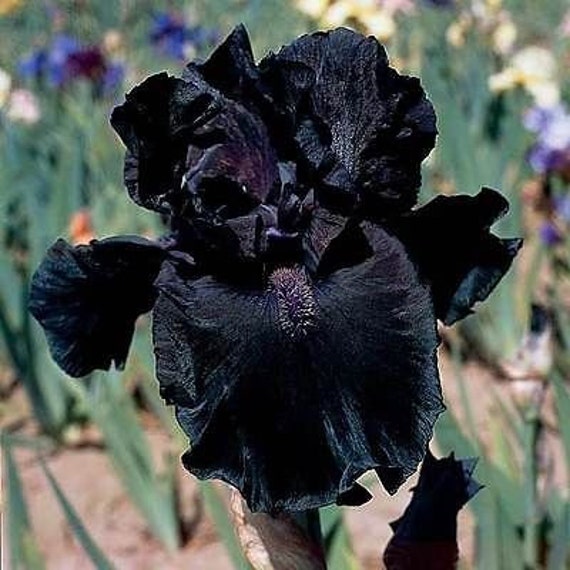Black Iris Bulbs
If you're looking for a unique and stunning addition to your garden, look no further than black iris bulbs. These flowers, with their deep, rich black hues, are sure to catch the eye of anyone who passes by.
While black iris bulbs may be breathtakingly beautiful, they can also be a bit of a challenge to grow. They require just the right amount of water, sunlight, and soil conditions to thrive, and are susceptible to a wide range of pests and diseases.
Despite these challenges, the rewards of growing black iris bulbs are well worth it. These flowers are sure to impress and create a striking focal point in any garden.
In this article, we'll take a closer look at black iris bulbs and provide you with everything you need to know to successfully grow these stunning plants.
What are black iris bulbs?
Black iris bulbs are a type of iris that produce stunning blooms with deep, dark black colors. These flowers can vary in size and shape, but are known for their unique and eye-catching appearance.
Personally, I first came across black iris bulbs while visiting a botanical garden on a weekend getaway. I was struck by their unique beauty and knew I had to try growing them in my own garden.
Black iris bulbs are typically planted in the fall and bloom in the late spring or early summer. They require well-draining soil and full sun exposure to thrive.
How to grow black iris bulbs
Before planting black iris bulbs, it's important to prepare your soil. These flowers require soil that is well-draining and rich in organic matter. Adding compost or vermiculite to your soil can help improve drainage and provide the nutrients these plants need to thrive.
When planting black iris bulbs, make sure to plant them at a depth of about 4 inches, with the roots facing down and the pointed end facing up. Water your bulbs regularly, making sure the soil remains moist but not waterlogged.
Once your black iris bulbs begin to bloom, it's important to continue to care for them properly. Make sure to water them regularly and provide them with plenty of sunlight throughout the day. You may also want to consider fertilizing them every few weeks to encourage healthy growth and blooms.
Tips for caring for black iris bulbs
To ensure your black iris bulbs stay healthy and vibrant, try these tips:
- Water your bulbs consistently to keep the soil moist but not waterlogged
- Fertilize your bulbs every few weeks during the growing season to encourage healthy growth and blooms
- Protect your bulbs from pests and diseases by using natural remedies
How to prevent pests and diseases in black iris bulbs
Black iris bulbs are prone to a number of pests and diseases, including aphids, mites, and fungal infections. To prevent these issues, try these natural remedies:
- Keep your soil well-draining and avoid overwatering
- Avoid overcrowding your bulbs, as this can attract pests and diseases
- Use natural pest repellents, such as neem oil or garlic spray
Question and Answer
Q: Do black iris bulbs require a lot of maintenance?
A: While black iris bulbs require proper care and attention, they are relatively low-maintenance compared to other flowering plants. With proper watering, fertilization, and pest control, your black iris bulbs should thrive.
Q: Can black iris bulbs grow in pots?
A: Yes, black iris bulbs can be planted in pots as long as the pots have drainage holes and are large enough to accommodate the bulbs. Make sure to use soil that is well-draining and water your bulbs regularly.
Q: Do black iris bulbs prefer sun or shade?
A: Black iris bulbs prefer full sun exposure, but can also tolerate some shade. If planting in an area that receives partial shade, make sure the bulbs receive at least 4-6 hours of sunlight per day.
Q: When is the best time to plant black iris bulbs?
A: Black iris bulbs should be planted in the fall, typically around September or October. This allows the bulbs to establish roots and prepare for blooming in the spring.
Conclusion
Black iris bulbs are a beautiful and unique addition to any garden, but they do require some special care and attention to thrive. By preparing your soil properly, watering and fertilizing your bulbs regularly, and protecting them from pests and diseases, you can enjoy spectacular black iris blooms year after year.
Gallery
Black Iris Seeds | Iris Flowers, Iris Garden, Bearded Iris

Photo Credit by: bing.com /
Top 9 Black Iris Bulbs – Flower Plants & Seeds – SreTso

Photo Credit by: bing.com / germanica rhizome fragrant sretso bearded
EXOTIC RARE "BLACK ONYX IRIS" Large Perennial Garden Bulb Plants

Photo Credit by: bing.com / iris plants flowers onyx rare flower bulb rhizomes exotic perennial garden bearded oil midnight irises bulbs homes dark posted am
Black Bearded Iris | Iris Flowers, Flower Bulbs Garden, Bearded Iris

Photo Credit by: bing.com / bearded bulb bulbblog
Have You Ever Seen A Black Iris? This Is Called "Hello Darkness

Photo Credit by: bing.com / iris flowers flower darkness hello amazing plants irises garden botanist became amateur royalty planting incredible beautiful flowering orchid dark purple